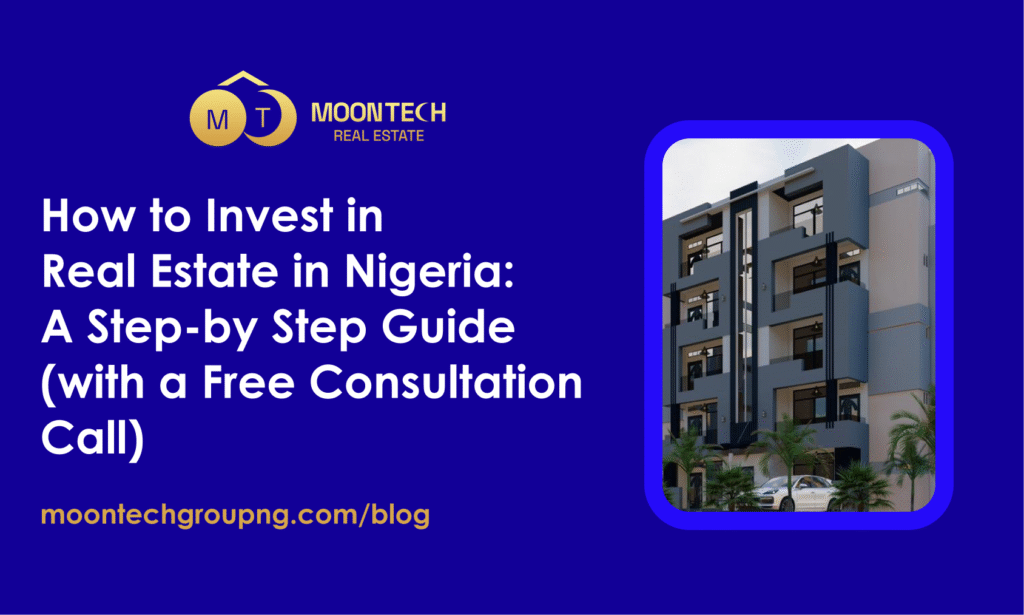Introduction
Real estate has long been one of the most trusted paths to building wealth in Nigeria. With rising urbanization, increasing infrastructure investment, and demand for housing growing by the day, property investment offers both security and opportunity. But while it sounds attractive, the process is often murky — legal issues, fraudulent land sales, and unexpected costs can all derail the dream.
If you’ve been thinking: How do I start investing in real estate in Nigeria? Where should I buy? What paperwork do I need? This guide breaks down exactly what to do, step by step, so you can invest wisely, protect your capital, and grow your returns.
Why Invest in Real Estate in Nigeria?
Before diving into the “how,” it helps to know why real estate is a strong investment in Nigeria. Understanding these reasons gives you motivation, foresight, and helps you plan better.
- Hedge Against Inflation & Currency Instability
Property values (especially land) tend to appreciate over time, often outpacing inflation. When Nigerian inflation is high, bricks, land, and housing often hold value more reliably than many fiat savings instruments. - Tangible Asset, Lower Risk of Total Loss
Unlike some speculative investments, real estate is physical. Even if demand fluctuates, land or buildings can’t disappear. Selling or restructuring is possible. - Passive Income Potential
Renting out property (long-term or short lets), leasing commercial space, or even marketplaces built around property (e.g. serviced apartments) can generate steady cash flow. - Population & Urban Growth Trends
Cities like Enugu, Abuja, Lagos, Port Harcourt are expanding very fast. Suburbs and satellite towns are developing. Infrastructure (roads, airports, trade zones) are being built and all this drives demand. - Appreciation in Emerging Areas
Places that were on the outskirts 5-10 years ago are becoming city hubs now. Early adopters in these zones have seen large capital appreciation. For example, Ibeju-Lekki in Lagos has been widely cited as such an area.
Step-by-Step Guide: How to Invest in Real Estate in Nigeria
Here’s how to move from idea to actually owning productive real estate.
Step 1: Define Your Investment Goal
Set your north star first by asking yourself:
- Do I want to Buy to Build or Flip vs Buy to Hold / Rent
So do you want quick returns (build and resale) or long-term income? Or land banking (buy now, wait for the price to go up)? - Time Frame
Are you thinking of holding your properties for 1-3 years, 5-10 years, or longer? The strategy and location will change accordingly. - Risk Tolerance & Capital Size
How much can you invest? Are you okay with less liquid investments? Smaller plots or partial buildings may be more realistic initially. - Type of Property
Land (undeveloped), residential, commercial, mixed use, serviced apartments, etc.
Step 2: Choose the Right Location
Location often matters more than anything else in real estate. A good property in a great area usually beats a great property in a marginal area.
What to look for:
- Ongoing or planned infrastructure: roads, airports, ports, trade zones, water, electricity.
- Government projects: If the government has plans for, say, a new expressway, free trade zone, or industrial park, the surrounding real estate often appreciates. Kabusa is a leading example because of projects like the commissioning of the new Kabusa-Ketti Road by the government
- Accessibility: Good road networks, proximity to business districts, schools, hospitals.
- Growth potential: Suburbs or satellite towns of big cities (Abuja, Lagos, Port Harcourt) often have cheaper entry and potential for capital growth. For instance, areas like Kabusa, Hutu & Centenary City in Abuja.
- Market demand: Where people want to live or rent (young professionals, families, businesses).
Cities/Areas with good Promise:
- Lagos – Ibeju-Lekki, Epe, Sangotedo, parts of Lekki-Epe Expressway corridor.
- Abuja – Lugbe, Kabusa, Cetenary CKuje, Gwarinpa, satellite towns.
- Ogun State – near Lagos (Abeokuta, Mowe, Ifo, Arepo) as growth spills over.
- Port Harcourt – GRA phases, road access, demand from oil/gas sector.
- Other emerging cities – Ibadan, Uyo, Enugu, Owerri, etc. Especially outskirts where prices are lower but infrastructure is improving.
Step 3: Set a Realistic Budget
Once you know roughly where you want to buy and what type of property, you need to know how much it’s going to cost: upfront and ongoing.
Components of cost:
- Cost of land or property (price per plot, per square metre, or building cost)
- Development / construction costs (if you are building or upgrading)
- Legal and documentation fees (title searches, land registry fees, consent, survey, lawyers)
- Service and infrastructure costs (access roads, drainage, electricity, fencing)
- Taxes, levies, and ground rents (depending on state, local government)
- Maintenance, repair, facility charges (if it’s an estate or shared amenities)
Don’t forget to include a buffer (10-30%) for unexpected costs: delays, change orders, price inflation, etc.
Step 4: Verify the Property’s Legality
This is where many people go wrong. Frauds with land transactions remain common, so doing due diligence is non-negotiable.
What to check:
- Title Documents: Certificate of Occupancy (C of O), Right of Occupancy, Governor’s Consent, Registered Deed, FCDA Verified Lands etc. Ensure it’s genuine and that no documents have been forged.
- Tell people or agencies: Visit the Land Registry, FCDA Office or Lands Office in the state. Confirm the seller is the rightful owner.
- Survey Plan: A proper survey or site plan from a recognized surveyor. Make sure boundaries, coordinates are clear and match the title.
- Check for encumbrances: Is anyone else claiming part of the land? Are there any legal disputes? Are there existing liens?
- Government Approvals: Planning approvals, zoning, permits. Especially if you intend to build.
- Estate Developer Checks: If buying from a developer or in an estate, check if the estate’s layout plan is approved by the relevant authorities.
Legal advice is very important. Hire a lawyer experienced in real estate in that state to help you with your legal processes so you don’t get defrauded of your hard earned money.
Step 5: Work with a Trusted Real Estate Company
You don’t have to do everything alone. Having the right team makes things smoother, safer, and often cheaper in the long run.
Who to involve:
- Estate Developer / Real Estate Firm: Pick a real estate company with a great track record, visible completed projects, strong reputations and great testimonials or client feedback. We at MoonTech have completed several projects and only sell FCDA verified property to our clients.
- Real Estate Agent with a registered company: Ensure that they’re licensed and trustworthy & that the company actually knows them and can vouch for them. Get referrals from your knowledgeable friends if you have to.
- Lawyer: For documentation, title verification, contracts.
- Surveyor: Especially for land, boundary checks, site plans.
- Accountant / Financial Adviser: If your investment is large-scale (for taxes, revenue projections).
Step 6: Secure and Develop Your Investment
Once you have the land or property, secured legally, then comes putting it to work.
What securing may involve:
- Fencing, marking boundaries.
- Clearing rights of way.
- Registering Power of Attorney if needed (especially if you’re abroad).
If developing:
- Building structures (residential homes, apartments, shops).
- Ensuring utilities (water, electricity, waste disposal).
- Interior finishes if renting out or selling.
If just holding / renting:
- Maintain the property.
- Get tenants. Decide if you’ll lease, do serviced/short let.
- Manage property: repairs, maybe property management company if you cannot supervise continuously.
Now that you know the steps that you should take, let’s dive into the mistakes first time investors make and how you can avoid them completely.
Common Mistakes New Investors Make
Knowing what others have done wrong helps you avoid the same pitfalls.
- Skipping legal due diligence: Buying without verifying title, survey, government approvals. Leads often to legal disputes, financial & property loss. If it sounds too good to be true it’s definitely too good to be true.
- Ignoring location potential: Buying in areas without infrastructure or government plans often yields low appreciation.
- Overpaying for undeveloped land: Paying high prices for land that isn’t serviced (no roads, utilities).
- Focusing only on capital gain, ignoring income potential: Sometimes a property with moderate capital gain but high rental yield is better if you need cash flow.
- Emotional buying rather than strategic: Buying just because it feels good or is trendy, without data on cost, access, demand. Yes we know that people buy with emotion and justify with logic but we also do know that for capital intensive projects like investing in real estate in Nigeria you’ll need to do your due diligence and back your emotions up with logic also.
- Failing to budget for hidden/ongoing costs: Security, maintenance, taxes, levies, fencing can eat into returns so they should always factor in your planning also.
- Working with unreliable developers or agents: Those who have no transparency, no record, pressure you with deceptive sales tactics should be avoided.
Tips for First-Time Real Estate Investors
If this is your first deal, these tips help you start strong.
- Start Small
Maybe a small plot or a single unit. Get experience and understand what’s involved in owning a piece of real estate and then scale. - Do a Site Inspection
Always go and see the site physically. Pictures can lie. Check roads, utility access, neighborhood. - Ask For References / Visit Completed Projects
See previous projects of the developer. Talk to people living there or who have bought before. - Negotiate Payment Terms
Sometimes you can pay in installments. Sometimes there are discounts if you pay early. Understand and negotiate because this saves you money as well. - Understand Market Trends
Keep up with infrastructure plans, population flows, government policies. For example, when a new airport or expressway is planned, or when government policy on property taxes or land registration changes. - Plan Exit Strategy
Whether you’ll sell after a few years, rent for income, or pass down. Know how you’ll realize your gains. - Keep Good Records
Contracts, receipts, survey plans, correspondence. If you’re abroad, ensure documents are appropriately notarised and acceptable.
Final Thoughts
Investing in real estate in Nigeria can be one of the most rewarding ways to build wealth but success lies in planning, doing your homework, and avoiding shortcuts. Define your goals, pick your location carefully, verify every legal detail, and surround yourself with trustworthy professionals.
Every large real estate empire starts with one small, well-chosen plot or property. The important thing is to start — don’t wait for perfect conditions because you might never see it. Every incremental step will accumulate over time.
If you’re serious about making your first investment or scaling up, reach out to us at MoonTech Real Estate and have a free consultation call with our real estate sales specialist and they’ll guide you on the process of acquiring your first property. Having an expert guide you, would definitely save you millions of Naira in missteps and legal costs.




